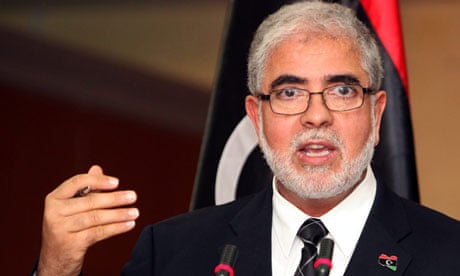Protesters stormed the chamber of Libya's parliament on Thursday, preventing MPs from taking their seats to vote on whether to approve a new cabinet.
The protest, involving 100 unarmed men from Zawiya, 30 miles west of Tripoli, comes amid growing signs of chaos and violence across the country.
The men said they objected to the failure to include among 29 cabinet nominees a minister from their city, which was one of the first to rise against Muammar Gaddafi's regime in last year's Arab spring revolution.
They agreed to clear the chamber peacefully, but the chances of Libya's parliament agreeing a cabinet soon were dealt a further blow hours later when the prime minister, Mustafa Abushagur, announced that MPs had informally rejected 13 of his nominees.
The procedure to pick the cabinet of the first freely elected parliament in more than 40 years has already proved controversial because members from the National Forces Alliance, the largest party in congress, have been excluded. Eyebrows have been raised across the political spectrum because many of the nominees for the cabinet are unknown to most Libyans.
On Thursday night Reuters reported that Abushagur had appeared on Libyan television and said he had withdrawn his proposed government list.
"I have asked the congress leader to withdraw my proposed government list and I will submit new nominations on Sunday," he said. "This new government should help build the state. Its members should have the right experience and be courageous."
The delay leaves Libya still without firm government, nearly three months after the parliamentary elections and with violence breaking out in several flashpoint towns.
Forces of a pro-government militia alliance, the National Shield, clashed overnight with units in Bani Walid, a former pro-Gaddafi town south-east of Tripoli. It was surrounded by tanks and artillery after the group was told to hand over men accused of the killing of a revolutionary from Misrata.
Further south there are reports that gold shops belonging to Misratans were set ablaze in the desert town of Sabha.
In Benghazi police and army units say they are facing regular guerrilla attacks by the Islamist militia Ansar al-Sharia, which is blamed by many for last month's killing of US ambassador Chris Stevens.
A specially formed army unit, the National Mobile Force, has begun operations against suspected Ansar al-Sharia hideouts, but said its task was complicated because the militia was ejected from its base on 21 September by anti-militia protesters.
"When they were all in the base they were easier for our intelligence guys to watch," said a force spokesman, Colonel Khalid Alakeri. "Now they were dispersed."
Ismail Salabi, leader of one of Benghazi's remaining Islamist brigades, Rafallah al-Sahati, which has joined government forces, said Ansar al-Sharia continued to pose a guerrilla threat. "They have gone into the shadows," he said.
The chaos in government, combined with the jihadist attack that killed the US ambassador and three fellow officials, has brought international business to a halt. Visits by trade delegations have been scrapped and Benghazi, which is Libya's second city, is almost empty of foreigners.
Power cuts are common and Tripoli residents have taken to dumping their uncollected refuse in great mounds in the ruins of Gaddafi's former home at Bab al-Aziziya.
